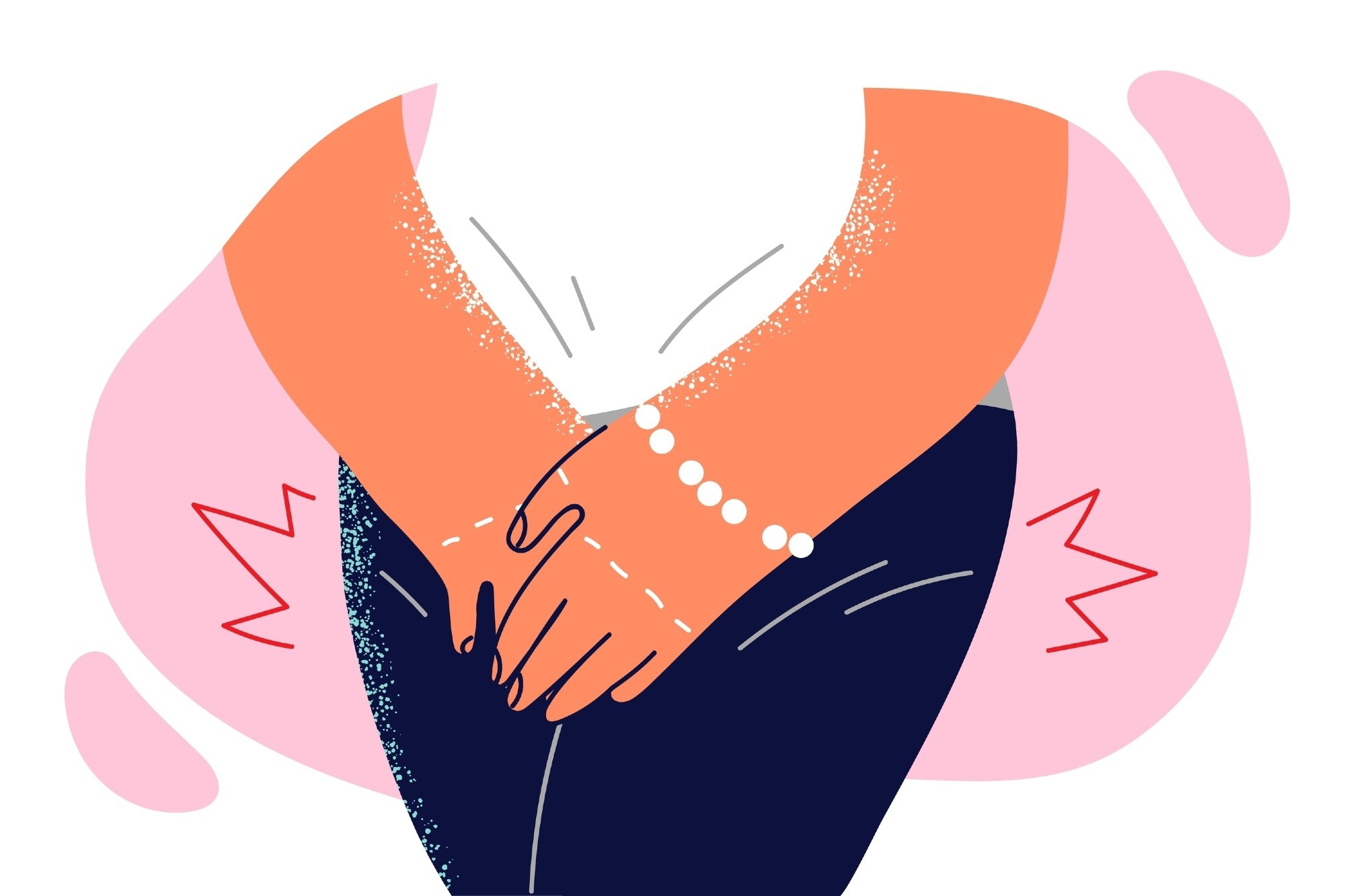What is chronic cystitis?
Symptoms of chronic cystitis
Who does chronic cystitis impact?
What causes chronic cystitis?
The long-term effects of chronic cystitis
Treatment options for chronic cystitis
References
Further reading
What is chronic cystitis?
Chronic cystitis, also known as interstitial cystitis, bladder pain syndrome, or painful bladder syndrome, is a poorly understood condition characterized by pelvic pain and urinary dysfunction. Patients often experience urinary frequency and urgency, as well as pain during urination.
While urinary tract infections (UTIs) typically resolve with antibiotic treatment, chronic cystitis presents a greater diagnostic and therapeutic challenge. This condition significantly diminishes the quality of life, with research indicating its impact is comparable to that of kidney dialysis or chronic cancer pain. Characterized by chronic bladder inflammation, chronic cystitis can lead to debilitating symptoms, in some cases exceeding 50 voids per day, causing pain and substantially disrupting daily activities.

Image Credit: Alphavector/Shutterstock.com
Symptoms of chronic cystitis
The symptom presentation of chronic cystitis is often highly variable among individuals; however, common manifestations include pelvic pain, which in women may be localized to the area between the vagina and anus, and in men to the perineum (between the scrotum and anus). Other frequently reported symptoms include bladder pressure, urinary frequency and urgency, urethral burning, painful intercourse, low-grade fever, hematuria (blood in the urine), or cloudy urine.
The course of chronic cystitis is often characterized by symptom fluctuation, with periods of exacerbation lasting several weeks, followed by periods of relative remission. In women, symptom severity may correlate with menstruation, and dietary factors, including certain foods and beverages, can also influence pain levels.
Due to its symptomatology, chronic cystitis can significantly impair daily life. This condition can adversely affect various aspects of a patient's well-being, including work, relationships, and mental health.
Who does chronic cystitis impact?
Chronic cystitis disproportionately affects women, with estimates suggesting a prevalence of 3-6% among women in the US, corresponding to approximately 3 to 8 million individuals. While men are believed to represent only 10% of all chronic cystitis cases, its prevalence in this population is likely underestimated due to frequent misdiagnosis as chronic prostatitis or chronic pelvic pain syndrome. Nonetheless, chronic cystitis remains predominantly a female condition, particularly among those over 30 years of age.
What causes chronic cystitis?
The precise etiology of chronic cystitis remains unclear, precluding the development of a single universally effective treatment. However, research has identified several potential contributing factors. These include hypotheses regarding urothelial dysfunction, pelvic floor muscle dysfunction, and immune system involvement. For instance, it has been suggested that cystitis may be caused by an inhibitory peptide in urine, which inhibits bladder epithelial regeneration and contributes to low-level inflammation1.
Recent research has been instrumental in gaining insights into cystitis and understanding how it may involve cell signaling activated by neurotransmitters. In this regard, it has been shown that chemically induced cystitis in rats alters muscarinic and purinergic receptors, potentially contributing to the development of chronic cystitis2.
Gene expression analysis can also help to understand the pathogenesis of chronic cystitis/painful bladder syndrome, aiding in the design of effective treatments and molecular diagnostic methods3.
The long-term effects of chronic cystitis
While chronic cystitis can persist for many years and significantly impact the quality of life, it is not a life-threatening condition and does not progress to bladder cancer.
Without proper diagnosis and treatment, chronic cystitis can cause significant and unnecessary pain, negatively impacting work, relationships, and sexual activity. Consequently, normal social functioning may become difficult.
Treatment options for chronic cystitis
Currently, there is no cure for chronic cystitis; however, several treatment options are available to manage symptoms. Common pharmacological interventions include:
- Oral medications such as pentosan polysulfate sodium (Elmiron), tricyclic antidepressants, anti-inflammatories, antispasmodics, antihistamines, and muscle relaxants.
- Bladder hydrodistention, performed under anesthesia.
These treatments are not universally effective, and patients may require a combination of approaches to achieve relief.
Relief for painful bladder and interstitial cystitis IC | ChristiMD Medical Group
Dietary modifications can play a significant role in managing chronic cystitis symptoms. Studies suggest that up to 90% of individuals with this condition report sensitivities to various foods and beverages. Healthcare providers often recommend limiting or eliminating potential dietary triggers, such as acidic foods (e.g., citrus fruits, tomatoes), spicy foods, caffeine (coffee and tea), alcohol, carbonated drinks, artificial sweeteners, and high doses of vitamin C. Consuming calcium glycerophosphate and/or sodium bicarbonate immediately after ingesting trigger foods may mitigate symptom exacerbation.
Self-management strategies also play an important role in managing chronic cystitis. These techniques include:
- Stress reduction
- Visualization
- Biofeedback
- Bladder training
- Regular exercise
Continued research into chronic cystitis is expected to yield further insights into its etiology, potentially leading to the development of disease-modifying therapies or a cure.
References
- Bassaly, R., Downes, K. and Hart, S., 2011. Dietary Consumption Triggers in Interstitial Cystitis/Bladder Pain Syndrome Patients. Female Pelvic Medicine & Reconstructive Surgery, 17(1), pp.36-39. https://journals.lww.com/fpmrs/Abstract/2011/01000/Dietary_Consumption_Triggers_in_Interstitial.7.aspx
- Birder, L., 2019. Pathophysiology of interstitial cystitis. International Journal of Urology, 26(S1), pp.12-15. https://onlinelibrary.wiley.com/doi/full/10.1111/iju.13985
- Friedlander, J., Shorter, B. and Moldwin, R., 2012. Diet and its role in interstitial cystitis/bladder pain syndrome (IC/BPS) and comorbid conditions. BJU International, 109(11), pp.1584-1591. https://bjui-journals.onlinelibrary.wiley.com/doi/abs/10.1111/j.1464-410X.2011.10860.x
- Homma, Y., Akiyama, Y., Tomoe, H., Furuta, A., Ueda, T., Maeda, D., Lin, A., Kuo, H., Lee, M., Oh, S., Kim, J. and Lee, K., 2020. Clinical guidelines for interstitial cystitis/bladder pain syndrome. International Journal of Urology, 27(7), pp.578-589. https://onlinelibrary.wiley.com/doi/full/10.1111/iju.14234
- Keay, S., & Warren, J. (1998). A hypothesis for the etiology of interstitial cystitis based upon inhibition of bladder epithelial repair. Medical hypotheses, 51 1, 79-83. https://doi.org/10.1016/S0306-9877(98)90260-2.
- Yamada, S., Yoshida, A., Kageyama, A., Mori, F., & Ito, Y. (2009). Muscarinic and purinergic receptors in the rat bladder are altered by chemically induced cystitis. Neurourology and Urodynamics.
- Karamali, M., Shafabakhsh, R., Ghanbari, Z., Eftekhar, T., & Asemi, Z. (2019). Molecular pathogenesis of interstitial cystitis/bladder pain syndrome based on gene expression. Journal of Cellular Physiology, 234, 12301 - 12308. https://doi.org/10.1002/jcp.28009.
Further Reading
Last Updated: Jan 3, 2025